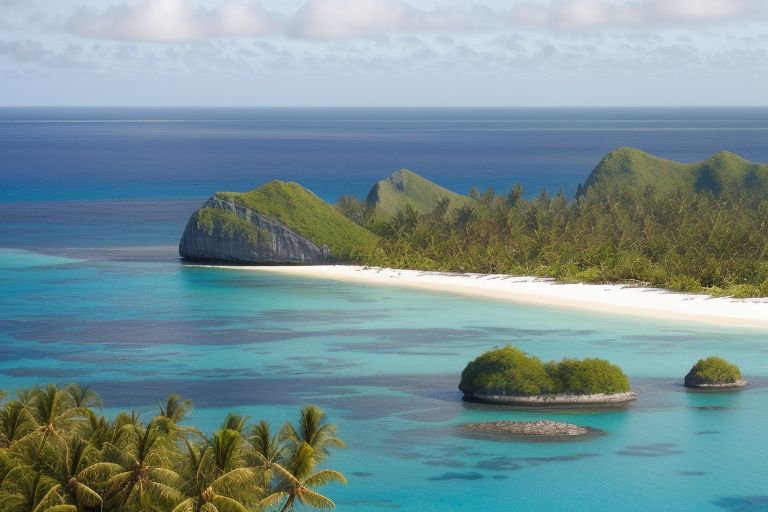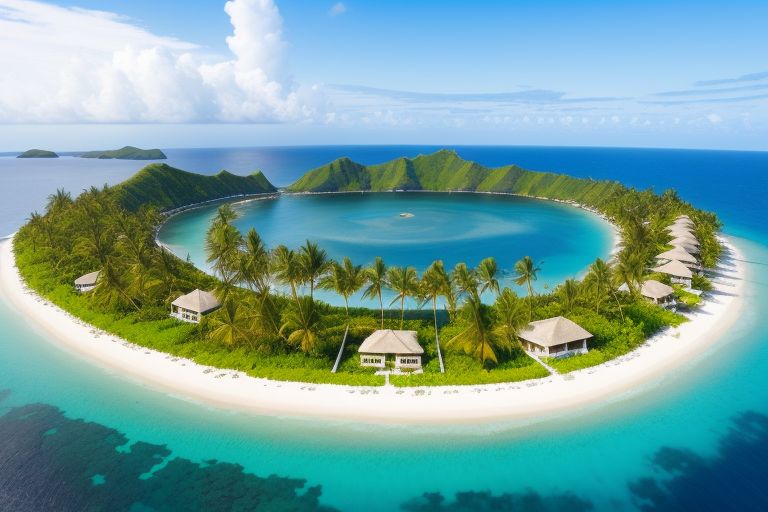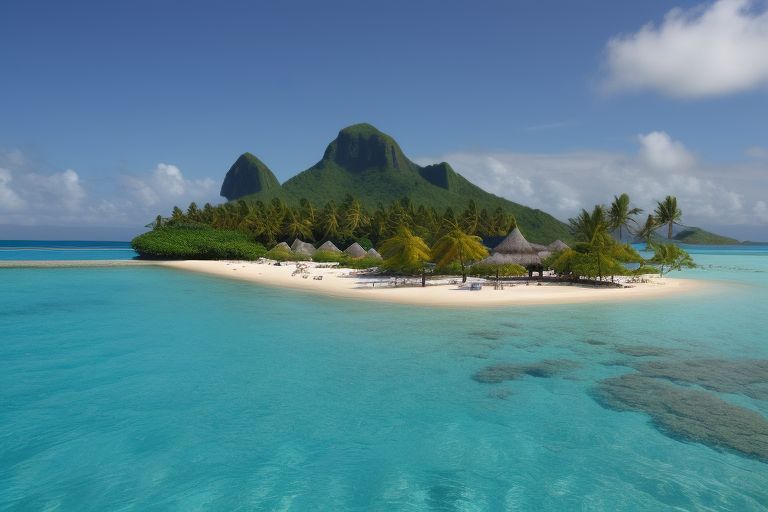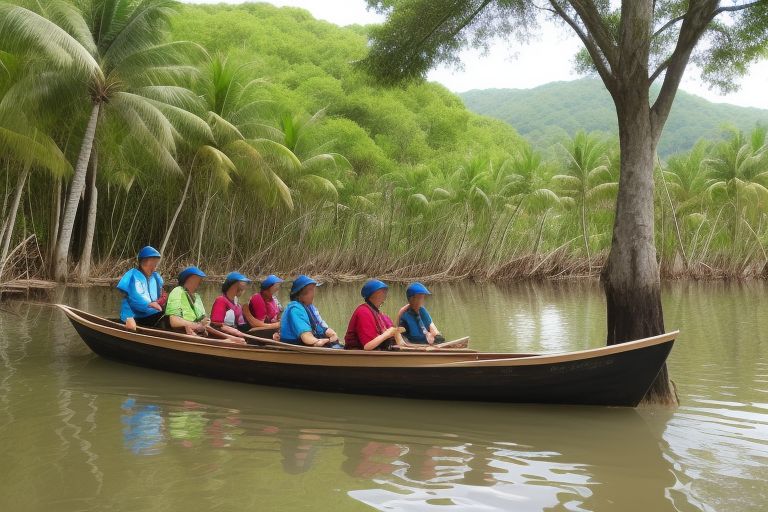
Exotic Islands, refers to a category of destinations characterized by their remote, tropical, and often breathtakingly beautiful settings. These islands typically boast pristine beaches, crystal-clear waters, lush vegetation, and diverse marine life. They offer travelers a chance to escape the ordinary and immerse themselves in a paradise-like environment. Activities on exotic islands often include snorkeling, diving, sunbathing, exploring local culture and cuisine, and simply enjoying the natural beauty of the surroundings. From the turquoise waters of the Maldives to the volcanic landscapes of Hawaii, exotic islands offer unforgettable experiences for those seeking relaxation, adventure, and a taste of paradise.
Table of Contents
A. Definition of Exotic Islands
Exotic islands refer to remote, secluded, or relatively unexplored landmasses surrounded by water, often characterized by their unique geographical features, biodiversity, and cultural distinctiveness. These islands are typically located in tropical or subtropical regions and are renowned for their pristine beaches, crystal-clear waters, lush vegetation, and vibrant marine life. Exotic islands captivate travelers with their sense of mystery, tranquility, and natural beauty, offering an escape from the hustle and bustle of everyday life.
B. Significance and Allure of Exotic Islands
Exotic islands hold immense significance and allure in the realm of travel and exploration. They evoke a sense of wanderlust and adventure, drawing travelers from around the world in search of idyllic landscapes, exotic wildlife, and authentic cultural experiences. The allure of exotic islands lies in their ability to provide a sanctuary for relaxation, rejuvenation, and spiritual renewal, away from the stresses of modern living.
Furthermore, exotic islands offer a gateway to discovery, allowing visitors to immerse themselves in the wonders of nature and connect with indigenous cultures and traditions. Whether it’s exploring pristine coral reefs, hiking through lush rainforests, or indulging in local cuisine, exotic islands offer a myriad of experiences that awaken the senses and create lasting memories.
Moreover, exotic islands play a crucial role in biodiversity conservation and environmental stewardship. These fragile ecosystems are home to a wealth of endemic species and serve as vital habitats for marine and terrestrial wildlife. By promoting sustainable tourism practices and responsible travel behavior, visitors can contribute to the preservation of these pristine environments for future generations to enjoy.
In essence, the significance and allure of exotic islands lie in their ability to inspire awe, wonder, and a sense of connection to the natural world. As havens of beauty, tranquility, and cultural diversity, exotic islands beckon travelers to embark on a journey of exploration and discovery unlike any other.
Characteristics of Exotic Islands

Characteristics of Exotic Islands encompass a variety of defining features that set these destinations apart and contribute to their allure:
A. Unique Geological Features
Exotic islands are renowned for their distinctive geological formations, shaped by volcanic activity, tectonic processes, and erosion over millions of years. These islands often boast dramatic landscapes, including rugged coastlines, towering cliffs, hidden caves, and pristine lagoons. Volcanic islands may feature volcanic craters, lava fields, and hot springs, adding to their allure and geological significance. The geological diversity of exotic islands contributes to their scenic beauty and provides a natural laboratory for geological research and exploration.
B. Diverse Flora and Fauna
Exotic islands harbor an extraordinary diversity of plant and animal species, many of which are endemic and found nowhere else on Earth. These islands support lush tropical rainforests, mangrove swamps, and coral reefs teeming with life. Flora includes a wide array of endemic species, such as exotic flowers, rare orchids, and unique tree species adapted to island ecosystems. Likewise, exotic islands are home to diverse fauna, including colorful birds, rare reptiles, endemic mammals, and marine creatures such as dolphins, whales, and sea turtles. The rich biodiversity of exotic islands makes them invaluable for scientific research, conservation efforts, and ecotourism activities.
C. Cultural Richness and Heritage
In addition to their natural beauty, exotic islands boast a rich cultural heritage shaped by centuries of human history and migration. Indigenous communities, colonial influences, and diverse cultural traditions have left their mark on the landscape, architecture, cuisine, and customs of these islands. Visitors can explore ancient ruins, traditional villages, sacred sites, and vibrant markets, immersing themselves in the local way of life and learning about indigenous cultures and traditions. Cultural festivals, music, dance, and arts and crafts showcase the cultural diversity and creativity of island communities, providing insights into their unique identity and heritage. The cultural richness of exotic islands adds depth and authenticity to the visitor experience, fostering cross-cultural exchange, appreciation, and understanding.
Popular Exotic Islands

are sought-after destinations known for their stunning natural beauty, diverse landscapes, and unique cultural experiences. These islands attract travelers from around the world seeking relaxation, adventure, and a taste of paradise. Here are descriptions of some of the most popular exotic islands:
A. Iconic Destinations
Iconic destinations such as Bali in Indonesia, the Maldives in the Indian Ocean, and Hawaii in the Pacific Ocean are renowned worldwide for their breathtaking beauty and unique cultural experiences. Bali, known as the “Island of the Gods,” captivates visitors with its lush rice terraces, volcanic landscapes, vibrant arts scene, and Hindu temples. The Maldives, with its pristine white-sand beaches, turquoise lagoons, and overwater bungalows, epitomizes luxury and romance. Hawaii, a volcanic archipelago in the Pacific, offers a diverse range of experiences, from surfing on legendary waves to exploring volcanic craters and lush rainforests. These iconic destinations draw millions of visitors each year, seeking relaxation, adventure, and cultural immersion in paradise-like settings.
B. Lesser-Known Gems
While iconic destinations often steal the spotlight, lesser-known gems offer travelers the opportunity to discover hidden treasures and off-the-beaten-path experiences. Places like the Seychelles, Palawan in the Philippines, and the Cook Islands are lesser-known but equally captivating destinations. The Seychelles, an archipelago in the Indian Ocean, boasts pristine beaches, granite boulders, and unique wildlife, making it a paradise for nature lovers. Palawan, known as the “Last Frontier” of the Philippines, features stunning limestone cliffs, secret lagoons, and vibrant coral reefs, ideal for diving and island hopping adventures. The Cook Islands, nestled in the South Pacific, offer a laid-back atmosphere, friendly locals, and untouched landscapes, perfect for a secluded getaway. These lesser-known gems provide a sense of exclusivity and authenticity, allowing travelers to escape the crowds and connect with nature in unspoiled surroundings.
C. Emerging Exotic Island Destinations
Emerging exotic island destinations are gaining popularity among adventurous travelers seeking new and unique experiences. Destinations such as Sri Lanka, Zanzibar in Tanzania, and the Azores in Portugal are emerging as top contenders for travelers looking to explore uncharted territories. Sri Lanka, known as the “Pearl of the Indian Ocean,” offers a blend of cultural heritage, wildlife adventures, and pristine beaches, including the iconic palm-fringed shores of Mirissa and the historic city of Galle. Zanzibar, an archipelago off the coast of East Africa, entices visitors with its spice markets, Swahili culture, and idyllic beaches, such as Nungwi and Paje. The Azores, a volcanic archipelago in the Atlantic Ocean, beckon travelers with their rugged landscapes, geothermal hot springs, and whale-watching opportunities. These emerging destinations provide a sense of exploration and discovery, offering unique experiences and insights into lesser-known cultures and environments.
Activities and Attractions
encompass a diverse range of experiences available to travelers visiting various destinations. From adventurous outdoor pursuits to cultural explorations, these activities and attractions cater to a wide range of interests and preferences. Here’s an overview:
A. Beaches and Marine Activities
Exotic islands are renowned for their pristine beaches and vibrant marine ecosystems, offering a plethora of activities for beach lovers and water enthusiasts. Visitors can indulge in sunbathing, swimming, snorkeling, and scuba diving in the crystal-clear waters surrounding these islands. From secluded coves and hidden bays to expansive stretches of powdery sand, exotic islands provide idyllic settings for relaxation and water-based adventures. Marine activities such as sailing, kayaking, paddleboarding, and jet-skiing offer opportunities to explore the coastline, discover hidden lagoons, and encounter marine life such as colorful corals, tropical fish, and majestic sea turtles.
B. Ecotourism and Adventure Sports
Ecotourism and adventure sports are popular attractions on exotic islands, allowing visitors to immerse themselves in nature and embark on thrilling outdoor adventures. Ecotourism activities such as hiking, birdwatching, and wildlife safaris enable travelers to explore the diverse ecosystems and natural wonders of these islands. From trekking through lush rainforests and climbing volcanic peaks to zip-lining over canopy treetops and rappelling down waterfalls, exotic islands offer adrenaline-pumping experiences for adventure seekers of all levels. Additionally, activities such as cave exploration, river rafting, and mountain biking provide opportunities to discover the hidden gems and off-the-beaten-path landscapes of these island paradises.
C. Cultural Experiences and Heritage Sites
Exotic islands are steeped in history, culture, and tradition, offering visitors the chance to immerse themselves in rich cultural experiences and explore fascinating heritage sites. Cultural activities such as attending traditional dance performances, visiting local markets, and participating in cooking classes provide insights into the indigenous cultures and customs of these islands. Heritage sites such as ancient temples, colonial-era buildings, and archaeological ruins offer glimpses into the storied past and cultural heritage of these island communities. Visitors can explore historic forts, sacred sites, and UNESCO World Heritage-listed landmarks, gaining a deeper understanding of the cultural significance and legacy of these exotic islands.
Challenges and Conservation Efforts
Challenges and Conservation Efforts, in the realm of travel and tourism encompass a variety of issues and initiatives aimed at preserving natural environments, protecting wildlife, and promoting sustainable practices. Here’s an overview:
A. Environmental Threats
Exotic islands face a range of environmental threats, including habitat destruction, pollution, climate change, and overexploitation of natural resources. Deforestation, habitat fragmentation, and land degradation threaten the fragile ecosystems of these islands, leading to loss of biodiversity and degradation of critical habitats. Pollution from plastic waste, sewage discharge, and chemical runoff poses significant risks to marine and terrestrial ecosystems, impacting water quality, coral reefs, and wildlife health. Climate change exacerbates environmental challenges, contributing to sea-level rise, ocean acidification, and extreme weather events, which pose grave threats to the sustainability of these island environments.
B. Overtourism and Infrastructure Strains
The allure of exotic islands has led to the phenomenon of overtourism, where destinations become overcrowded, leading to environmental degradation, cultural erosion, and strain on infrastructure and resources. Overtourism can result in habitat destruction, overexploitation of natural resources, and pollution, leading to negative impacts on the environment and quality of life for residents. Additionally, inadequate infrastructure such as roads, waste management systems, and sanitation facilities may struggle to cope with the influx of visitors, leading to congestion, pollution, and degradation of the visitor experience. Addressing the challenges of overtourism requires careful planning, sustainable management strategies, and community engagement to ensure the long-term viability of tourism on these islands.
C. Conservation Initiatives and Sustainable Tourism Practices
Efforts to address the challenges facing exotic islands include conservation initiatives and the promotion of sustainable tourism practices. Conservation efforts focus on protecting and restoring critical habitats, preserving biodiversity, and mitigating the impacts of climate change and pollution. This may involve establishing protected areas, implementing sustainable fishing practices, and reducing carbon emissions through renewable energy initiatives. Sustainable tourism practices aim to minimize the environmental footprint of tourism activities while maximizing the socio-economic benefits for local communities. This includes promoting eco-friendly accommodation options, supporting locally owned businesses, and educating visitors about responsible travel behavior. By integrating conservation principles and sustainable tourism practices, exotic islands can balance the needs of visitors and residents while safeguarding the natural and cultural heritage of these unique destinations.
Ecotourism Potential and Community Engagement

Ecotourism Potential and Community Engagement revolves around sustainable tourism practices that prioritize environmental conservation, community involvement, and cultural preservation. Here’s an overview:
A. Opportunities for Responsible Travel
Exotic islands offer abundant opportunities for responsible travel, allowing visitors to experience the beauty of natural environments while minimizing their impact on fragile ecosystems. Responsible travel practices include choosing eco-friendly accommodations, supporting locally owned businesses, reducing waste and plastic consumption, and respecting wildlife and cultural heritage. Activities such as guided nature walks, birdwatching tours, and sustainable fishing excursions enable visitors to connect with the environment in a responsible and meaningful way, fostering appreciation and stewardship for the natural world.
B. Community-Based Tourism Initiatives
Community-based tourism initiatives empower local communities to participate in and benefit from tourism activities while preserving their cultural heritage and natural resources. Exotic islands often host community-led initiatives such as homestays, cultural tours, and handicraft workshops, providing opportunities for visitors to engage with local traditions, customs, and way of life. These initiatives create economic opportunities for residents, promote cultural exchange and understanding, and foster partnerships between tourists and local communities. By involving residents in tourism planning and decision-making, community-based initiatives ensure that tourism benefits are distributed equitably and contribute to sustainable development goals.
C. Economic and Social Benefits
Ecotourism and community-based tourism initiatives generate a range of economic and social benefits for local communities on exotic islands. Economic benefits include job creation, income generation, and entrepreneurship opportunities in sectors such as hospitality, tour guiding, and artisanal crafts. By diversifying income sources and reducing dependency on traditional livelihoods, tourism can improve the economic resilience and well-being of island communities. Social benefits include cultural preservation, community pride, and enhanced social cohesion, as tourism provides opportunities for residents to showcase their cultural heritage, traditions, and skills to visitors. Additionally, tourism revenues can be reinvested in community development projects, infrastructure improvements, and conservation initiatives, further enhancing the quality of life for residents and ensuring the long-term sustainability of tourism on exotic islands.
| Section | Description |
| Introduction | Introduces the concept of exotic islands, highlighting their appeal and significance. |
| A. Definition of Exotic Islands | Defines exotic islands based on their characteristics and allure. |
| B. Significance and Allure | Discusses the significance of exotic islands in travel and exploration. |
| Characteristics of Exotic Islands | Describes the unique geological, biological, and cultural features of exotic islands. |
| Popular Exotic Islands | Highlights iconic, lesser-known, and emerging destinations in the realm of exotic islands. |
| Activities and Attractions | Lists various activities and attractions available on exotic islands. |
| Challenges and Conservation Efforts | Discusses environmental threats, overtourism, and conservation initiatives on exotic islands. |
| Ecotourism Potential and Community Engagement | Explores opportunities for responsible travel and community involvement in tourism. |
Exotic islands captivate travelers with their pristine beaches, vibrant marine life, and rich cultural heritage, offering a sanctuary for relaxation, adventure, and exploration. From iconic destinations like Bali and the Maldives to lesser-known gems like the Seychelles and Palawan, these islands provide a diverse range of experiences for visitors seeking a taste of paradise. However, they also face environmental threats and challenges such as overtourism, pollution, and habitat destruction. Conservation efforts and sustainable tourism practices are crucial for preserving the natural and cultural heritage of exotic islands while ensuring the long-term viability of tourism. By embracing responsible travel and community engagement, travelers can contribute to the conservation and sustainable development of these island paradises for future generations to enjoy.
FAQ (Frequently Asked Questions):
1. What defines an exotic island? Exotic islands are remote, secluded, or relatively unexplored landmasses surrounded by water, typically located in tropical or subtropical regions. They are characterized by unique geological features, diverse flora and fauna, and rich cultural heritage.
2. What are some popular exotic island destinations? Popular exotic island destinations include Bali, the Maldives, Hawaii, the Seychelles, Palawan, Sri Lanka, Zanzibar, and the Azores, among others. These destinations offer stunning natural beauty, diverse landscapes, and unique cultural experiences.
3. What activities can visitors enjoy on exotic islands? Visitors to exotic islands can enjoy a variety of activities such as sunbathing, swimming, snorkeling, scuba diving, hiking, birdwatching, wildlife safaris, cultural tours, and culinary experiences. These activities cater to a wide range of interests and preferences.
4. What are the main challenges facing exotic islands? Exotic islands face environmental threats such as habitat destruction, pollution, and climate change, as well as challenges related to overtourism and strain on infrastructure and resources.
5. How can travelers contribute to the conservation of exotic islands? Travelers can contribute to the conservation of exotic islands by practicing responsible travel behaviors such as choosing eco-friendly accommodations, supporting local businesses, reducing waste and plastic consumption, and respecting wildlife and cultural heritage. Additionally, participating in community-based tourism initiatives and volunteering for conservation projects can make a positive impact.

